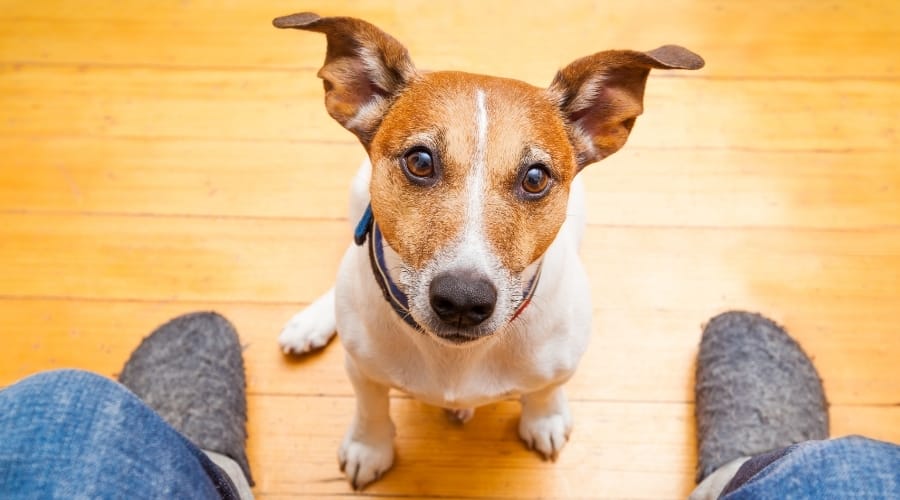Is Your Dog Yawning Or Throwing Shade? You’ll Be Surprised By The Answer
When you purchase through links on our site, we may earn a commission. Here’s how it works.
If your dog just let out a huge yawn, they could be tired or quietly judging your life choices. Dog yawning isn’t always about sleep. It can mean stress, excitement, confusion, submission… or that they’re vibing with your emotions. Wild, right?
Table of Contents
In this quick guide, I’ll decode what dog yawning really means, how to tell the difference between “just tired” and “lowkey panicking,” and when (if ever) you should worry. It’s weird, it’s adorable, and yes, sometimes it’s your dog being way more polite than you’d expect.
What Is a Yawn?
Before I decode dog yawning, let’s talk about what a yawn even is. In simple terms, it’s an involuntary reflex where the mouth opens wide, the lungs fill with air, and for some reason… it feels oddly satisfying.
Humans do it. Dogs do it. Pretty much all vertebrates do it. And here’s the weird part: science still doesn’t fully know why. It’s not often that we share such a mysterious behavior with our canine companions! Some theories say it cools the brain, others link it to boredom, stress, or social bonding.
Bottom line? Yawning is a universal behavior with not-so-universal answers, and your dog’s doing it for reasons that go way beyond sleep.
Why Do Dogs Yawn? 6 Reasons
If you’ve ever caught your dog mid-yawn and thought, “Wow, same”, you’re not alone. That big open-mouth stretch might look like a classic nap cue. But here’s the twist: Dog yawning is low-key one of the most misunderstood behaviors in the canine playbook.
The exact reason behind the dog yawn may be unknown, but we have studied our canine friends enough to come up with a few possible causes. Sure, sometimes it means “I stayed up too late barking at the wind.” But other times, it means something completely different.
In this section, I break down the six most common reasons your pup might be letting out that slow-mo jaw stretch. So, let’s decode the dog yawn.
1. They’re Tired
Let’s start with the most commonly understood reason behind canine yawning: tiredness. Just like you and I, our dogs may simply yawn because they are tired.
Our pups can experience grogginess in the heat, exhaustion at the end of a long day, and every sleepy spell lying at your feet. Especially if they’ve just had zoomies, a long walk, or spent the last hour barking at imaginary intruders (aka squirrels).
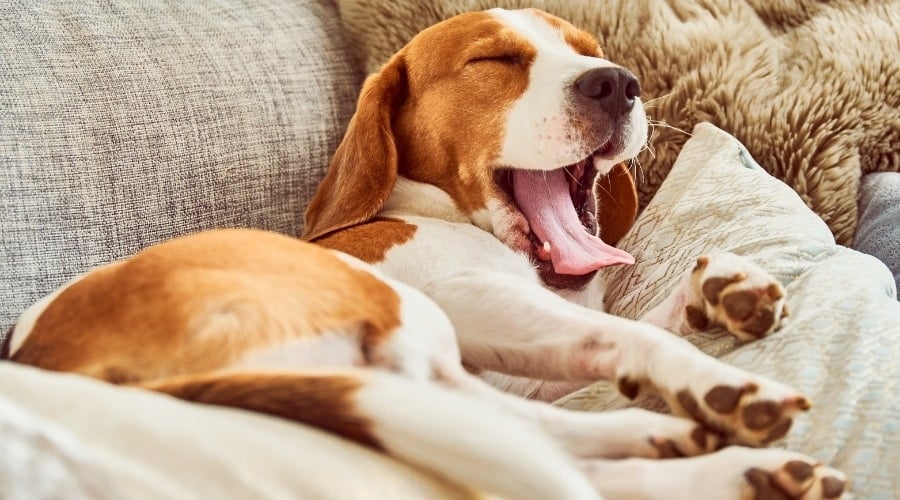
A good ol’ yawn helps dogs stretch their jaw and reset, just like us, after binge-watching a docuseries we swear we’re done with.
2. They’re Stressed
But here’s the twist: dogs also yawn when they’re not tired at all.
In fact, a yawn can be a calming signal, kind of like your pup saying, “Let’s chill,” or “This is a little much for me right now.” If your dog yawns during play, around new people, or in busy places, it might be more about emotions than exhaustion.
If your dog experiences excessive yawning, it could be a sign of stress. Dogs that are stressed can exhibit a range of reactions, including head tilting and constant paw licking.
Yawning around bedtime may be extremely normal for your furry friend, but any increase in frequency may be their way of telling you they are nervous. Some humans even experience yawning as a symptom of their anxiety, and dogs are no different.
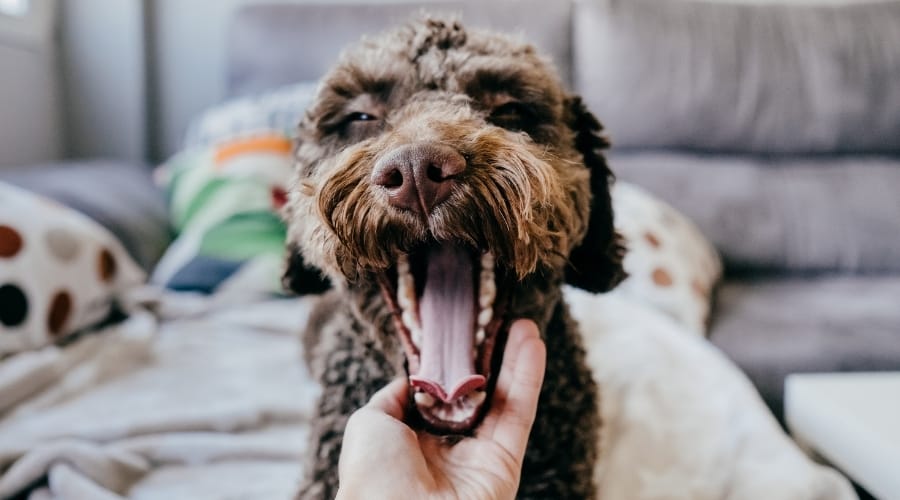
Determining whether yawning is due to stress or not will require paying attention to when the behavior occurs…
For example, if your dog seems to yawn excessively when they are in the car and heading to the vet, it’s safe to say they may be yawning due to nervousness or anxiety. If anxiety is the true cause of their yawning, it should come to an end once they calm down.
A dog yawning can be a form of involuntary communication. If your pup experiences excessive yawning at all times, it may be best to contact a professional trainer or dog behaviorist to address their chronic anxiety.
3. They’re Being Empathetic
Yes, your dog might literally be catching your yawn, and it’s not just because you’re boring them.
Contagious yawning is a real thing, and it doesn’t just happen between humans. Studies have shown that some dogs yawn after watching their humans yawn, and it’s believed to be a subtle sign of emotional connection. In short, your dog might be mirroring you because they feel close to you.
Another study published in Biology Letters found that dogs were more likely to “catch” a yawn from their owner than from a stranger. Translation? Your bond is strong enough to make your yawns go viral.
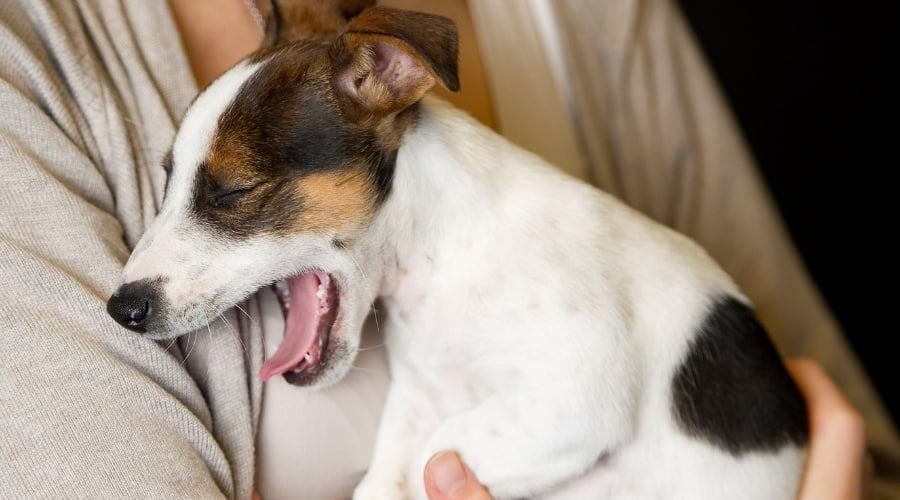
And get this, dogs don’t just copy yawns randomly. It usually happens in relaxed settings, with dogs that are secure in their relationship with their human. So if your dog yawns right after you, don’t take it personally. Take it as a compliment.
Your dog isn’t mocking you, they’re empathizing with you. Probably while silently judging your lack of snacks.
4. They’re Being Submissive
Sometimes, a yawn is less “I’m tired” and more “Let’s not make this weird.”
Dogs often use yawning as a social softener, a way to show they’re not a threat. You might spot it when they’re approached by a more dominant dog, a loud stranger, or even when you raise your voice mid-rant about the Amazon driver.
In the dog world, this kind of yawn is basically saying, “Hey, I’m just here to vibe, not throw paws.” It’s part of a larger category called calming signals, subtle behaviors dogs use to de-escalate situations and avoid conflict. Think of it like canine diplomacy.
You’ll often see these submissive yawns paired with other peacekeeping moves: turning the head, lowering the tail, or doing that adorable sideways glance that screams, “Please ignore me into safety.”
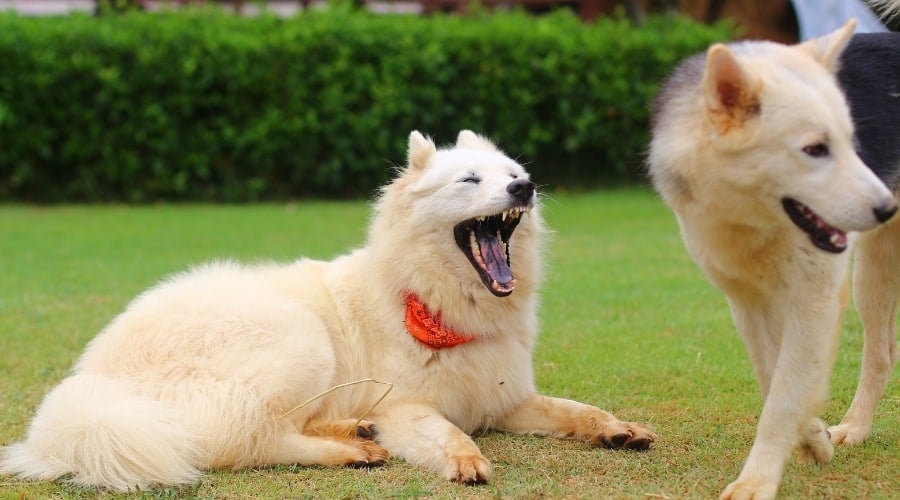
I see this all the time with my two dogs, Bonkers, my older, dignified gent, and Chips, the chaotic toddler tornado disguised as a Dachshund.
After about five minutes of rowdy play, Bonkers will stop, give a massive yawn, and do that classic “I’m done here” head turn. It’s the canine equivalent of putting on pajamas at a party. But Chips? She never gets the message. She thinks it’s an invitation to body slam him again.
You can practically see the moment he gives up on communication and just walks away like a tired kindergarten teacher. This is his subtle canine “please leave me alone”, and Chips is way too amped to take the hint.
So, I usually have to step in and distract her with a toy or redirect her energy before Bonkers files a formal complaint.
5. They’re Excited
Not all yawns mean “I’m over it”, some mean “LET’S GOOOO.”
Dogs can yawn when they’re hyped, especially during high-energy moments like playtime, when you grab the leash, or right before a car ride. It’s a counterintuitive move: they’re full of adrenaline, and yet… yawn.
Why? It’s their way of self-regulating all that buzzing excitement. Think of it like a pressure valve before they explode into zoomies; they yawn to keep it together (well, sort of).
You’ll usually see this type of yawn paired with happy wiggles, tail wags, or frantic pacing. If your dog yawns and then bolts to the door with that “ready for chaos” face, you’ve got an excited yawn on your hands.

When you get home each day, they may be thrilled the moment you walk in the door. You may see them circling and pacing with happiness, and even yawning from time to time. This is a normal reaction in our canine friends, and should subside once they engage in the activity they are awaiting.
6. They’re Confused Or Overwhelmed
You give a command. Your dog tilts their head, pauses, and yawns. Nope, they’re not suddenly sleepy mid-training. They’re confused, and that yawn is their version of a mental timeout.
Dogs often yawn when they’re unsure what you want, especially during learning or in overstimulating environments. It’s a signal that their brain’s buffering, like your Wi-Fi during a thunderstorm.
This kind of yawn is common in puppies, rescue dogs, or any dog facing a new experience they haven’t quite figured out yet. Think of it as the dog version of “I’m trying, but I have no idea what’s going on.” You might notice this during obedience classes, after repeated failed commands, or when introducing something unfamiliar (like a stroller, a costume, or, let’s be honest, a vacuum cleaner).
Once you’ve gone through the appropriate steps, your dog should stop this behavior and start executing the commands instead. For dogs that are stubborn or considered of lower intelligence, it may take a few more repetitions to learn commands.
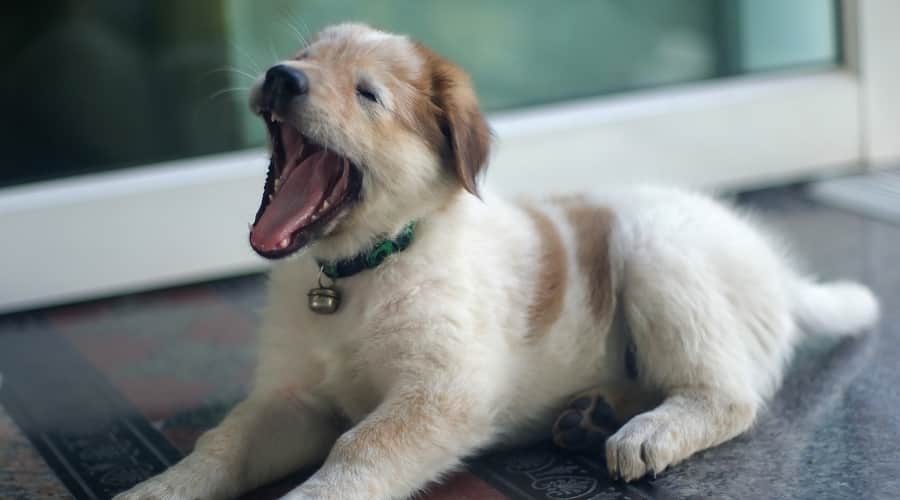
Want to see these dog yawns in action? We’ve put together a quick video breaking down all the weird, sweet, and side-eye-worthy reasons dogs yawn, complete with real pup clips. Watch the video now and find out which yawn your dog does most!
When To Worry About Dog Yawning
I spoke with a vet, Dr. Amber LaRock, DVM, about dog yawning, and here’s what she had to say about when it might be more than just a harmless habit.
Yawning is a normal behavior that you see in both humans and dogs. An occasional yawn when your pup is tired is to be expected, and shouldn’t warrant any concern. It’s completely normal for your dog to yawn. But there are some situations that should cause you to think twice.
If you notice that excessive yawning in any situation, it may be a sign that they need to step away and calm down. While this can be curative for dogs with situational anxiety, it becomes more challenging when this occurs in your home.
If you find your pup yawning in rapid succession in the comfort of your home, it may be time to assess your home for any potential triggers.
Stress in dogs can be triggered by a sudden change of environment, new pets in the home, the sudden absence of a loved one, and more. Identifying the source of your dog’s anxiety may help you bring your pup comfort. It can also help put an end to frequent yawning.
If you cannot determine the cause of their stress, it may be time to contact a professional trainer or veterinarian for guidance.
– Dr. Amber LaRock, DVM, Veterinarian Contributor to Canine Journal
4 Red Flags Behind A Dog Yawning Too Much
Most dog yawning is harmless, even sweet. But sometimes, it’s your pup’s subtle way of saying “Something’s off.” Here’s how to tell the difference between a normal yawn and one that could be signaling discomfort, stress, or even a health issue.
- Yawning paired with pacing, whining, or panting. This combo often points to anxiety or overstimulation.
- Yawning constantly in one specific environment. Like only at the vet, daycare, or when left alone, this could signal fear or separation anxiety.
- Yawning with other signs of illness. If yawning is accompanied by drooling, shaking, lethargy, or loss of appetite, contact your veterinarian.
- Yawning while avoiding eye contact and freezing. This may signal fear-based aggression or feeling cornered.
Pro Tip: Keep a “yawn journal” (yes, really). Noting when and where your dog yawns can help you spot patterns and prevent meltdowns before they happen.
Frequently Asked Questions About Dog Yawning
Got questions about your dog’s yawns that we haven’t covered? You’re not alone. This topic receives surprisingly deep interest. Below, I’ve answered some of the most common questions dog parents ask. Still curious? Drop your question in the comments, we’d love to add it to the list!
Is It Normal For Dogs To Yawn A Lot?
Yes, especially if they’re in new environments, feeling overwhelmed, or just waking up. However, if yawning is excessive and accompanied by stress signals (such as pacing, whining, or drooling), it’s worth consulting your veterinarian.
Why Does My Dog Yawn When I Pet Them?
Yawning during petting can be a calming signal. Your dog may be enjoying the attention, but also trying to regulate excitement or overstimulation.
Why Does My Dog Yawn When I Talk To Them?
If your tone is emotional (angry, excited, loud), your dog might be picking up on that energy. Yawning in this case can mean they’re trying to calm you, or themselves.
Can Dogs Yawn Out Of Boredom?
They can! Just like us, dogs may yawn when they’re understimulated or waiting around. Try offering a fun toy, training game, or a walk to see if it helps.
Do Dogs Yawn When They’re In Pain?
Sometimes. While yawning isn’t a primary pain signal, if it’s happening alongside signs like limping, hiding, or whining, it could be a stress response to discomfort.
Is Dog Yawning Contagious Between Dogs Or Between Dogs And Humans?
It can be! Studies suggest that dogs yawn more often after seeing their humans yawn, especially if there’s a strong emotional bond. Some dogs even catch yawns from other dogs.
More Weird Dog Habits? Oh, We’ve Got Plenty.
Yawning’s just the start. A wagging tail doesn’t always mean they’re happy; it can also be a sign of pure anxiety or apprehension. And if they’re chasing their tail like it owes them money? That might be boredom, instinct, or something deeper.
Face licking could be a sign of love… or a canine way of saying “please give me attention.” And those wild zoomies after bath time? That’s often stress relief in overdrive.
And then there are the truly what-is-wrong-with-you behaviors: like eating poop (yep, there’s a name for that), rolling in mystery stink at the park like it’s designer cologne, or that awkward habit of nose-diving straight into your crotch the second guests arrive. As gross as they seem, each of these has a weird evolutionary reason.
Have you caught your dog yawning at suspiciously specific times, like when you sing in the car or try to cuddle them mid-nap? Or maybe they’ve got another weird habit you can’t quite decode? Drop your funniest, strangest, or most “what just happened?” dog moment in the comments. We’re obsessed with reading them!
